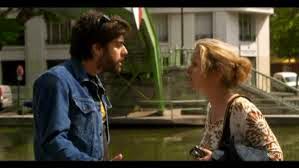I watched "Downfall" ("Der Untergang") believing that it was a documentary about Hitler's secretary Traudl Junge. There was a documentary made about the movie's fly-on-the-wall character - "Blind Spot. Hitler's Secretary." I'll probably watch that as well at some point. "Downfall", from what I can read on the net, however, appears to be a mainly historically accurate film about Hitler and his inner circle in their last days in the Berlin bunker. And though I have read a lot about the Third Reich before, it was mainly from a distance. From a distance this machine seemed somehow grandiose and terrible, unstoppable like the Party in "1984." It at least seemed to be run by competent, if evil, people. But as portrayed in "Der Untergang", the Third Reich is a cult that is falling apart, its members losing faith or spiraling into suicidal insanity.
 |
| Hitler's former secretary, Traudl Junge, as she appears in the beginning and end of the film. |
Hitler's bunker, in the film, resembles nothing so much as a cult - a Heaven's Gate or Jim Jones situation. Indeed, many of the inner circle are portrayed committing suicide and taking their families with them - willingly or unwillingly. Even a dog is subjected to this ritual suicide. These are a people who have come so much to believe in their own myth-making, their own prejudice, their own skewed vision of the world - that they can't imagine a life worth living after the Third Reich - even people who must know they would not be found culpable of the Third Reich's crimes. Meanwhile Hitler and his commanders' refusal to surrender is shown to be needlessly wasting the lives of civilians in the world above the bunker. Children and teenagers fight fanatically and senselessly on Hitler's behalf, old men are shot for refusing to do the same, wounded and sick people are abandoned in hospitals. None of it matters to Hitler, who vacillates between looking at his architectural model for a new Berlin with Albert Speer and believing himself betrayed by each and every person under his command.
It is hard to believe, watching this movie, that Hitler was able to rise to power, to win so many followers and this type of devotion. Perhaps the unreason in him, the madness in him, called to a madness in many other people. Perhaps his delusions were delusions that many others wanted to believe. It's been a long time since I read it, but "Hitler's Willing Executioners", by Daniel Jonah Goldhagen, made the case that the anti-Jewish sentiment was already there in the German people. http://www.nytimes.com/books/97/03/09/bsp/hitler.html
That would make the power of a man who was so delusional much more comprehensible. That he did suffer from delusions does seem backed up by historical references, especially from Albert Speer's book "Inside the Third Reich." This movie does not seem to be attempting to fictionalize Hitler but to demystify him.
Today, Hitler's bunker is under a parking lot, marked by a historical plaque, itself only recently erected. It is not somewhere I want to visit, but I have always been fascinated by this historical period. Part of it is maybe lurid, but in writing this entry, I begin to think that a bigger part of me just wants to understand how such unreason, racism, and lack of compassion - probably sociopathy - can come to be followed by so many people and can come to nearly dominate the world. It's important to remember that the world isn't inevitably good. I think a lot of people who grew up white and middle-class in the United States, like me, assume freedom, assume a world of progress. Maybe this is less true these days, post 9-11, post-Guantanamo. I don't know. But I think the assumption is faulty. Though Hitler meets his pitiful downfall in this film, I think Roger Ebert said it best in his review of the film: "It is useful to reflect that racism, xenophobia, grandiosity and fear are still with us, and the defeat of one of their manifestations does not inoculate us against others."
http://www.rogerebert.com/reviews/downfall-2005











